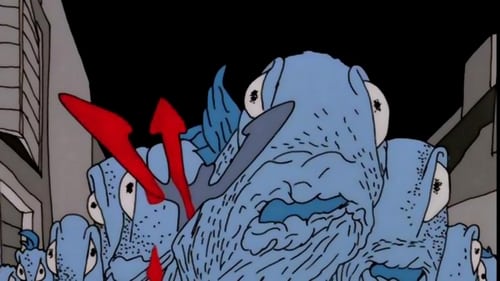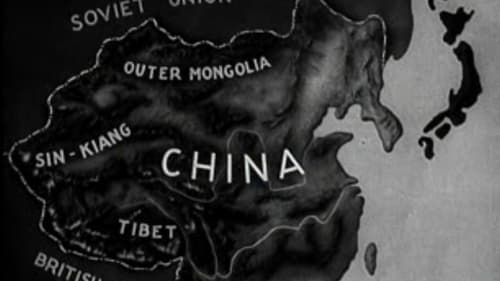The Year of the Deer (1995)
Género : Animación, Drama
Tiempo de ejecución : 5M
Director : Georges Schwizgebel
Sinopsis
The story of a young deer deceived by appearances, or how a good deed in haste can be the cause of a tragedy.

A descrition of a game between two teams where one of the teams change the rules.

The story of Cinderella is modernised. Cinderella dreams of clouds and ends up fleeing by plane with her Prince Charming. The image is animated simultaneously at various speeds (decor, moving elements, characters) in connection with the sound tape played by Georges Schwizgebel on the piano. It is an intelligent variation on a well-known story with which the viewer can identify

An animated short where no real story is being told and the perspective is constantly shifting.

With the complicity of a painter, an elderly man recovers youth and manages to wander through paintings.

Le vol d'Icare es el segundo corto del maestro suizo del cine de animación Georges Schwizgebel y por su originalidad y virtuosismo ya hay quien la considera su primera obra maestra. La técnica hace uso de enormes píxeles, otorgando a la película un aspecto muy digital y muestra los repetidos intentos de un hombre en volar como los pájaros. Debido a su técnica, aunque las figuras del hombre o las aves estén simplificadas en extremo, son reconocibles al instante.

Short film by Zbigniew Rybczyński.

A surreal journey of a displaced spirit as he wanders in the interminable darkness through the temporal landscape of a quaint and isolated feudal-era fishing village. Guided by a series of faintly illuminated rooms, the wandering spirit comes upon ancient souls who take on physical forms as they recount their personal stories of daily existence, loss, and tragedy in the peasant community. Intrigued by his initial visit to a curiously distracted elderly woman, the spirit returns to her home in order to ask a fundamental question - "What is happiness?" - an existential query that is innocently answered with innate humility and accepted unknowingness.

A fishing village falls prey to a nightmare revenge from the sea. Award-winning Yugoslavian animated short film.

A six minute short made in New York City by Jeffrey Noyes Scher.

The 400 million people of China are heirs to a great civilization, as their pagodas and stone lions can attest. But they are under attack from the Japanese. Civilian refugees walk, stumble, crawl to escape the destruction of their cities... While in the China of tradition, water buffalo still work the paddies and camels cross the desert, modern China is now a republic founded by Dr. Sun Yat-sen, with modern schools, heavy industry, large engineering projects... The government of Chiang Kai-shek resists the Japanese invasion from the coast. Madame Chiang receives a cheque from the U.S.A. for war relief. War production continues in distant villages safe from the grasp of the Japanese. With modern weapons the Chinese are pursuing their struggle behind enemy lines. And still their opponent persists in his reprisal bombings of civilian targets. "Will these people win?"

Lucifer sends his trusty minions out into the world to lead the good folk of Nigeria unto temptation in order to lock them into his cage. The good pastor Lazarus who has noticed the signs, realizing that hell is about to be unleashed on Earth, sets about righting wrongs through the power of prayer.

Between a wave’s rhythm and the breath of a young woman in her sleep, some animated paintings go on modifying each other.

Through paintings that interact on the principle of Russian dolls, we are drawn along the swirling path of the thoughts of a pilgrim, a solitary walker.

Lonely, old parents living on a small farm look forward to their son's visit. The man finally shows up one day, but he separates himself from his parents with a newspaper. Inadvertently, he drops a slice of bread. His father picks it up respectfully.

In his experimental short film "Brutalität in Stein" (Brutality in Stone), Alexander Kluge demonstrates how Nazi architecture used dimensions of inhuman and super-human scale to bolster the regime's politics of the same kind. Shots of huge neo-classical architectural structures from the Nazi period are confronted with equally anti-human national-socialist language as a voice-over.

The first Studies were synchronized with records (Fischinger made a total of 13 Studies all without sound). It was only with the introduction of sound, beginning with Study No 6 that the films did full justice to this musical principle. The play of the white lines, the arcs, and the upside-down U’s running hither and thither like ballet dancers was brought into perfect synchronization with the music, and thus the films offered an abstract illustration of the melodies. Study No 6 is certainly the best of his films in terms of forms. - Hans Scheugl and Ernst Schmidt, Jr.

The film chronicles filmmaker Joel DeMott, significant other/film partner Jeff Kreines and filmmaker Mark Rance as they head to Michigan to make a low budget horror film.

The film starts by a visit to bucolic Normandy before the events. This peaceful atmosphere is shattered by Operation Overlord, minutely described in the second part of the documentary. The landing on D-Day and the ensuing battles and bombings martyr the peaceful area giving the earth thousands of body instead of seeds. In the last part, the dreadful aftermath of the steel storm is shown both with sympathy for the victims and hope for the future, since all these sacrifices, whether military or civilians, have not been in vain.

A lonely woman sends off for a special mail-order package.

The story based on the mysterious portrait of the town of Nabua in northeastern Thailand. Soon after nightfall when the crepuscular violets concede to blackness, the wind’s rustling intensifies and the boys come out to play.







